|

|
Assistive
Technology Faire
|
Abstract: This 13th annual
event will be conducted on-campus in-classroom and will provide an opportunity
for students to get an up-close look at a variety of devices and learn about
available programs from product vendors and service agencies. Please browse to
the Call for Assistive Technology Faire Participants
webpage if you would like to participate in this event as an in-person
vendor of assistive technology products or services.
Activities:
-
Setup: Vendors will
set up on tables in the classroom. Students and community guests will be
provided with a printed copy of this webpage as a guide to the
vendors.
-
Activity: Students
will be asked to visit each vendor, ask questions, and identify the most
interesting product or service they saw.
Confirmed 2025 Vendor
Participants:
|

|
Silicon Valley
Independent Living Center
SVILC Assistive Technology Specialist - Joe
Escalante
Silicon Valley Independent Living
Center (SVILC) is a cross-disability, intergenerational, and multicultural
disability justice organization that creates fully inclusive communities that
value the dignity, equality, freedom and worth of every human being. SVILC
maintains a
lending
library of assistive technology so consumers may borrow a device free of
charge and try it before buying it, use it to compare similar devices, or to
use while a personal device is being repaired. |
|
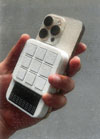
|
PocketDot
PocketDot, Inc. - Adil Jussupov &
David Madey
PocketDot is a Braille display that
provides visually impaired and blind individuals with private and convenient
access to texting, web browsing, and other textual communication with their
mobile phones. |
|

|
BeeLine
Reader
BeeLine Reader, Inc - Nick
Lum
"BeeLine Reader is a software tool
that improves reading ability by displaying text using a color gradient that
wraps from the end of one line to the beginning of the next. (Example) This gradient pulls the
reader’s eyes through the text, making reading easier. This approach is
especially helpful for readers with dyslexia, ADHD, and various vision
impairments. Thanks to the
Schwab Learning
Center, BeeLine Reader’s tools are available for
free to all Stanford
students." |
|

|
SignUp
Mariella Satow
SignUp Media is an app that overlays a sign language interpreter
on streaming platforms, providing full media accessibility to the Deaf
community. Available with a simple one-click installation for movies and TV
shows on Netflix and Disney+. |
|

|
Amazon Accessibility
Amazon Accessibility Team - Mark Tamura, Susan
Lin, Gyana Dash, Bofei Wang, Sneha Veeranki and Jared Penner
"Amazon's vision is to be Earth's most customer-centric
company. Our goal isn't simply to make things accessible, but to make products,
services, and experiences that are delightful for customers with
disabilities."
Customers can use
Fire tablets with
Bluetooth refreshable braille displays,
customize their reading
experience on the Kindle application, and navigate and interact with their
Fire tablet with
Switch
Access. They can enjoy Fire TV's rich set of
accessibility features, including the award-winning
VoiceView
screen reader,
audio
support for compatible hearings aids for private listening,
Text
Banner which adds a compact and customizable written banner that appears in
a fixed location on the screen, and more. |
|
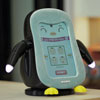
|
Robot MOMO
Whydots -
Youngseop Yoon (CEO), Jelie Meow, Danny Lee
MOMO
is an AI-powered robotic companion for children with developmental
disabilities. It enhances emotional comprehension, social skills, and cognitive
development. MOMO uses AI to facilitate personalized conversations tailored to
each child. It helps children recognize and express emotions through
interactive content, and encourages empathy through fun activities such as
storytelling and games. MOMO has penguin-inspired design and a touchscreen
interface. It uses customizable materials to ensure comfort and accessibility.
The robot is user-friendly and suitable for children aged 3 and above.
Validated through clinical studies, MOMO is suitable for use in both home and
institutional settings, supporting balanced development for
children. |
|
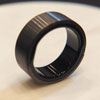
|
Lotus
Ring
Lotus - Dhaval Patel (Founder and
CEO)
For people with limited mobility, Lotus is a
patented wearable ring to control objects at home by pointing. With Lotus,
control anything a wall switch controls, like lights and fans - and even the TV
- from wherever you are in the room. No rewiring, no apps, no
internet. |
|

|
Third Arm
Salisbury
Robotics Lab - Prof. Kenneth Salisbury
"We
will be demonstrating a wearable 3rd arm designed for holding objects relative
to the wearer. Prototypes and the final version will be available for
examination." |
|
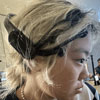
|
Duet: Brainwaves to
Music
Stanford Computer Science -
Sophia Zhang & Justin Wu
"Duet is a
mind-controlled music composer. Users can put on an EEG device, and Duet will
live-generate music based off of their emotions. It can help
nonverbal/physically disabled people express themselves through music straight
from their brain." |
|
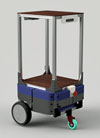
|
Jeeves
Harmony
Robotics - Sandeep Dutta
"Jeeves is an
assistive robot that carries up to 80 lbs. with ease, autonomously navigates
the user's home - including scheduled trips to specific spots - follows the
user around through gesture-driven operation, features a touchscreen-responsive
controller, and offers many more capabilities. This everyday helper transports
belongings - including laundry, groceries, and dishes - helps locate items at
home, serves as a mobile storage unit, learns and adapts to the user's routine
movements, and offers much more. Jeeves supports a more self-sufficient and
independent lifestyle for individuals with special needs, wheelchair users,
older adults, and many others. In care facilities, Jeeves facilitates
round-the-clock resident monitoring and assists with the transport of food and
essential care items to residents." |
|

|
Brava Smart
Oven
Brava Home, Inc. - Travis Rea, VP Sales &
Marketing and Zac Selmon, Head of Product
"Brava's Smart Oven enables safe, independent cooking with a fast,
light-based technology. With new and evolving features designed specifically
for assistive technology users, Brava is ideal for the blind/low vision,
intellectual and developmental disability and/or limited mobility communities.
It simplifies meal prep with automated features, guided recipes, and a
comprehensive mobile app. Continuous software updates enhance functionality and
accessibility, ensuring Brava meets diverse needs and constantly improves the
cooking experience for individuals seeking culinary self-reliance."
|
Cancelled 2025 Vendor
Participant:
|
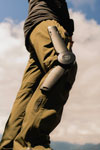
|
MO/GO
Skip -
Patrick Franks
"Skip is a small start up company
developing powered wearable technology they call movewear, dedicated to
enhancing human movement and accessibility. With a focus on innovation and
real-world impact, Skip aims to transform how people interact with their
environments through advanced technology. Their first product, MO/GO, is one
part robot, one part technical pants - a motor-powered movement assist
exoskeleton embedded in lightweight hiking pants. Think of it as an e-bike for
hiking: enabling users to tackle elevation like never before by providing a
boost to the leg muscles on the way up and supporting the knees on the way
down." |
2024 Vendor
Participants:
|

|
BeeLine
Reader
BeeLine Reader, Inc - Nick
Lum
"BeeLine Reader is a software tool
that improves reading ability by displaying text using a color gradient that
wraps from the end of one line to the beginning of the next. (Example) This gradient pulls the
reader’s eyes through the text, making reading easier. This approach is
especially helpful for readers with dyslexia, ADHD, and various vision
impairments. Thanks to the
Schwab Learning
Center, BeeLine Reader’s tools are available for
free to all Stanford
students." |
|

|
Silicon Valley
Independent Living Center
SVILC Assistive Technology Specialist - Joe
Escalante
Silicon Valley Independent Living
Center (SVILC) is a cross-disability, intergenerational, and multicultural
disability justice organization that creates fully inclusive communities that
value the dignity, equality, freedom and worth of every human being. SVILC
maintains a
lending
library of assistive technology so consumers may borrow a device free of
charge and try it before buying it, use it to compare similar devices, or to
use while a personal device is being repaired. |
|

|
DUG: A
communication device to prevent people from distracting service dogs
Team DUG - Steven G. Opferman
DUG is a commercial Bluetooth speaker attached on the
service dog owner, service dog, bags, or mobility device, along with a
custom-built microprocessor-based remote control worn or held to trigger
pre-recorded audio messages that inform people not to distract the service dog.
This student project from 2023 has been awarded second place in RESNA's Student
Design Challenge at its Annual Conference held in New Orleans. |
|

|
911Finder
Cellular Watch
911 Tracker - Chuck & Susan
Roedel
"The
911Finder
serves people with dementia, Alzheimer's, Autism, or who are prone to wander -
featuring fall detection with GPS. It provides peace of mind for the caregiver
that the wearer is safe. The wearer and caregiver can call each other with the
touch of a button. The caregiver's 911Finder App receives an alert if the
wearer is outside a Safe Zone or falls. If the caregiver believes the wearer is
having an emergency, the App can command Finder to use its patented method to
make a 3-way call between the caregiver and the 911-Operator located nearest
the wearer. Finder provides real-time GPS to help First Responders get to the
wearer quickly." |
|

|
TINA
TINA
Healthcare - Ali Kight, PhD Candidate and Founder
"TINA Healthcare has built the first assistive device for
menstruation. Our product, TINA, the Tampon INsertion Aid, is a reusable device
that clips onto off-the-shelf tampons and facilitates insertion and removal.
TINA was originally designed for people with spinal cord injuries but now
supports people with a broad range of mobility limitations and body types. TINA
Healthcare's mission is to build a suite of products that enables and empowers
every body to manage their menstrual cycles and reproductive health with ease
and comfort." |
Faire Material:
- Slides - 294 Kb pdf file
- Handout - 121 Kb pdf file
- Photos - 2.10 Mb pdf file
- Brochures, articles, and
weblinks:
- Feminine
Hygiene Just Got Easier for People with Disabilities
- Previous Assistive Technology
Faires - 2024 -
2023 -
2022 -
2021 -
2020 -
2019 -
2018 -
2017 -
2016 -
2015 -
2014 -
2013
|